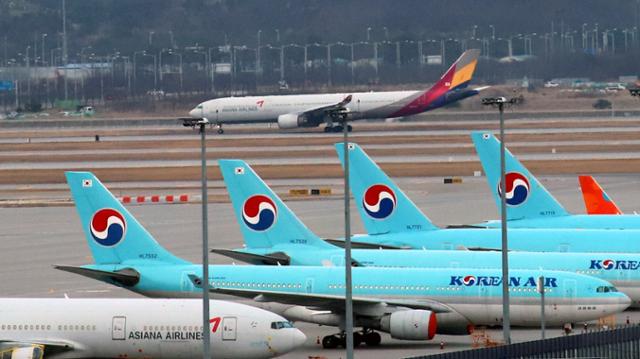Korean Air applied for a business combination to the FTC
Controversy over monopoly and whether Asiana can be rehabilitated

On the 1st of last month, an Asiana Airlines passenger plane is landing on the runway of Incheon International Airport. Newsis
The Fair Trade Commission has begun the process of reviewing Korean Air’s acquisition of Asiana Airlines. The FTC is planning to conclude the approval of the merger, focusing on concerns about monopolies due to the integration between the two major domestic airlines and whether Asiana Airlines can recover.
The FTC announced on the 14th that Korean Air has received a business combination report related to the acquisition of Asiana Airlines shares.
In the case of mergers and acquisitions between companies △If the acquisition company’s assets or sales are more than 300 billion won △If the other company’s assets or sales are more than 30 billion KRW, the acquisition company must undergo a competition restriction examination by the Fair Trade Commission. Korean Air has filed a business combination report not only with the Fair Trade Commission but also with overseas competition authorities such as the United States, the European Union, and China.
The main issues in the approval of the merger will be the intensification of monopoly and whether there is an exception.
Korean Air claims to be free from the monopoly problem. Korean Air President Woo Ki-hong said at a press conference last month, “After the company merges, the total slot share of Incheon Airport’s passenger routes is 38.5%, so there will be no monopoly issue.” A slot is a specific takeoff and landing date and time assigned to an individual airline.
However, in a report published recently, the National Assembly Legislative Investigation Office said, “There is no possibility of replacing demand between routes with different destinations, so it is meaningful data for determining whether the slot share of individual routes rather than the total slot share is a real monopoly.” There is a possibility that there is a route that there is.” The report also pointed out that “38.5% does not contain information on the slot share of international and domestic routes that are not departing from Incheon.”
However, even if there is a possibility of monopoly, if Asiana Airlines is recognized as a so-called’non-renewable company’, a business combination may be granted. Rather than a situation in which the value of a particular company’s assets and facilities are completely extinguished, it may be more desirable to have another company take over and put it into production even if a monopoly occurs.
In order to be recognized as an exception, it must be judged that △Asiana Airlines meets the requirements of a company that cannot recover due to financial structure △It is difficult to continue to utilize Asiana Airlines’ production facilities except for the acquisition of Korean Air, and △There is no alternative with less competition restrictions than the acquisition of Korean Air. do.
In fact, in the case of a business combination between Jeju Air and Eastar Jet last year, the Fair Trade Commission saw that the Cheongju-Taipei route satisfies the requirements for estimating competition restrictions under the Fair Trade Act, but approved the business combination because it determined that it was an exception to rehabilitation.
The Fair Trade Commission said, “We plan to carefully examine in accordance with the standards and procedures set by the Fair Trade Act.” The business combination review period can be extended up to 120 days if necessary, but the actual review period may exceed 120 days as the data correction period is not included here.
Sejong= Youngha Son reporter [email protected]
The new standard changed by Corona, the new normal of’un·home·sl·on’ is coming.

Balance to see the world, the Hankook Ilbo Copyright © Hankookilbo
